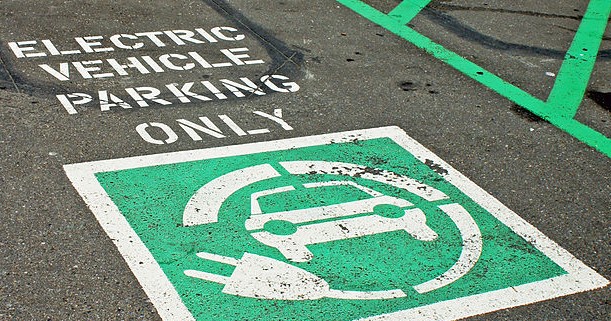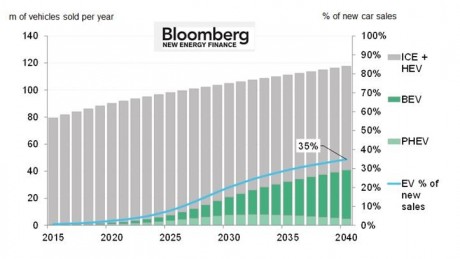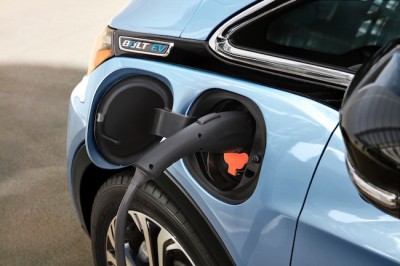
Electric cars will be cheaper to own than gas models by 2022, analysts predict
by Cleantech Canada Staff

New report says falling battery costs will make EVs more attractive than gas sippers, even if oil prices continue to slide

The new report finds battery electrics will make up 35 per cent of new light-duty vehicles sales by 2040. PHOTO: Mariordo, via Wikimedia Commons
NEW YORK—The long-awaited electric vehicle revolution is upon us—at least according to a new Bloomberg New Energy Finance analysis.
The clean energy research arm of the financial data and media company predicts the 2020s will finally be the decade the electric car emerges from its early-adopter niche and goes mainstream.
The biggest factor in the predicted rise of the EV? Falling cost.
And not just the slight sticker-price improvements battery electrics (BEVs) have logged against traditional fuel vehicles so far, but costs that make EVs the more attractive option. The report predicts the economics of battery technology, gas prices and emissions regulations will make electrics cheaper to own than gas or diesel cars in most countries by the mid-2020s. Even factoring in lower oil prices, the researchers say battery technology is advancing so quickly that gas guzzlers, and even gas sippers will soon be left in the lurch—though sustained $20 per barrel oil costs could delay the revolution until 2030.

Chart showing the growth in electric vehicles’ market share. PHOTO: Bloomberg New Energy Finance
“At the core of this forecast is the work we have done on EV battery prices,” Colin McKerracher, lead advanced transportation analyst at the research firm, said. “Lithium-ion battery costs have already dropped by 65 per cent since 2010, reaching US$350 per [kilowatt hour] last year. We expect EV battery costs to be well below $120 per kWh by 2030, and to fall further after that as new chemistries come in.”
As costs fall, Bloomberg predicts EVs will make up an increasing share of the vehicle market, penetrating 35 per cent of the industry by 2040, which represents some 41 million electric cars.
“This would be almost 90 times the equivalent figure for 2015, when EV sales are estimated to have been 462,000, some 60 per cent up on 2014,” the report notes.
The report relies on oil prices recovering to $50 per barrel and then trending up to $70 a barrel by 2040. Meanwhile, Salim Morsy, a senior analyst at BNEF and author of the study said lower crude prices of $20 a barrel could delay EV advances until the 2030s—though he insists the electrics are coming one way or other.

The Chevy Bolt will look to catapult EVs into the mass market. The vehicle is slated to go into production later this year. PHOTO: General Motors
It’s also important to note that subsidies do not play a role in the analysis; The report measures the total cost of BEV ownership on an unsubsidised basis against cars with internal combustion engines.
“In the next few years, the total-cost-of-ownership advantage will continue to lie with conventional cars, and we therefore do not expect EVs to exceed 5 per cent of light duty vehicle sales in most markets—except where subsidies make up the difference,” Morsy said. “However, that cost comparison is set to change radically in the 2020s.”
With some of the first purely electric mass-market vehicles slated to hit the market this year and next with the launch of the Chevy Bolt and Tesla Model 3, the market for traditional vehicles is likely to face its first true test—and if the Bloomberg research is proved correct, it may be the beginning of the end.